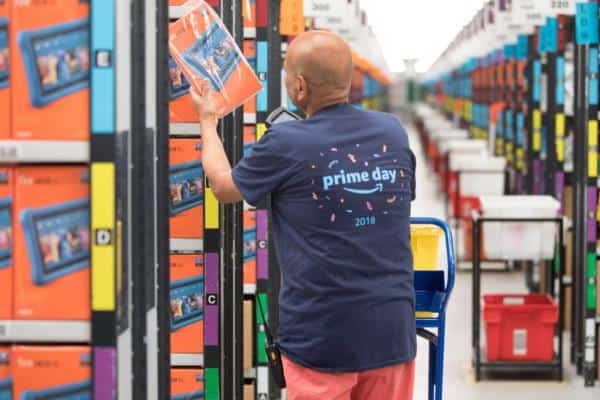Ecommerce had its worst ever month in September, when sales grew by just 0.7% compared to the same time last year, according to the latest British Retail Consortium figures. At the same time, retail sales across all channels turned in their worst September performance since British Retail Consortium records began. The BRC demanded clarity on Brexit as it said the spectre of a no-deal was weighing on consumer purchasing decisions – and hitting retailers hard.
Online sales of non-food products grew by just 0.7% in September – the lowest ever recorded in the channel by the BRC-KPMG Retail Sales Monitor – even as shoppers made more of their purchases online. Some 29.9% of non-food sales took place online in September, up from 28% a year earlier.
Retail sales across all sales channels fell by 1.3% in total what the BRC said was the worst September since it started tracking the metric in 1995. That’s below the 0.7% recorded a year ago, and the trends over three (-0.4%) and 12 months (+0.2%). On a like-for-like basis, that strips out store, and business, openings and closures, sales were down by 1.7%. That’s below the figure for last September (-0.2%), the last three months (-0.8%) and the last 12 months (-0.4%). This the lowest 12-month average since August 2009, when the UK was in recession.
“With the spectre of a no-deal weighing increasingly on consumer purchasing decisions, it is no surprise that sales growth has once again fallen into the red,” said Helen Dickinson, chief executive of the BRC. “Many consumers held off from non-essential purchases, or shopped around for the bigger discounts, while the new autumn clothing ranges suffered from the warmer September weather. The longer-term prospect continues to be bleak, with the 12-month average once again plumbing new depths at a mere 0.2%. Online non-food sales growth was the lowest on record, though still compared favourably to the decline in growth at physical stores.
“With four months of negative sales growth since March, the ongoing political gridlock surrounding Brexit is harming both consumers and retailers. Clarity is needed over our future trading relationships with our closest neighbours and it is vitally important that Britain does not leave the EU without a deal.”
How does online compare to in-store?
Growth of non-food items fell to 0.7% in September – the lowest ever recorded by the BRC-KPMG Retail Sales Monitor. It’s well below growth of 5.4% recorded in September 2018, compared to the previous year, and below the longer-term trend over three months (+2.1%) and 12 months (+3.8%). With 29.9% of sales taking place online, just over 70% of retail sales took place in stores. These were still harder hit as non-food sales fell by 3.2% on both a total and a like-for-like basis. That’s below the 12-month total average decline of 2.9%.
Paul Martin, UK head of retail at KPMG, said September had proved a difficult month for retailers, with even online sales closer to stalling. “Ongoing Brexit uncertainty is clearly having a material impact on the consumer psyche, with all but one non-food category being in decline in September. Consumers are choosing to focus on the essentials, with food one of the few categories delivering growth. We will likely experience increased promotional activity to clear surplus stock, which doesn’t bear well for retailers desperately trying to make up for lost ground after several difficult months. Retailers’ focus needs to be on cost and efficiency with only the leanest and most efficient operations coping with this extreme test of endurance. October and the ramping up of Brexit plans will clearly be a real test for the industry as a whole.”
How did food sales hold up?
Food sales were in more positive territory, growing by 0.3% LFL in the three months to September and by 1.2% in total. Nonetheless, it was below the 12-month total average growth of 1.7% – itself the lowest since March 2017.
Susan Barratt, chief executive of grocery analyst the IGD, said: “September seems to have seen something of a return to normality for the food and grocery market after the ups and downs of the summer. While taking a bit of a boost from some late seasonal weather at the beginning of the period, sales stabilised in modestly positive territory as the month progressed.” She said retailers would now be looking forward to Autumn events, such as Hallowe’en to improve momentum in the run-up to Christmas.
Analyst reaction
Commenting on the figures, Richard Lim, chief executive at analyst Retail Economics, said that its research suggested that those who backed leaving the EU might be more likely to spend than those who had backed remain.
“Our research shines a light on the polarisation between ‘remainers’ and ‘leavers’,” he said. “Intuitively this makes sense, but he differences are vast – much larger than I had expected. Deep-rooted divisions have manifested into consumers’ spending intentions, with 30% of remain voters claiming Brexit is the greatest source of concern affecting their confidence to spend, compared to just 6% of leave voters. Indeed, 86% of leavers suggested that Brexit was ‘not important at all’ in their confidence to spend, more than twice the proportion of remainers (39%).” However, 63% of remainers said they would be taking this into account when deciding on spending in the last three months of the year.
Image: Fotolia








